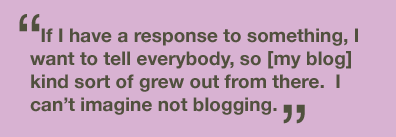
Blogs as Reflections of Identity
Q: When and why did you start keeping a blog?
C: Before I started blogging I participated in various forums on the Internet like discussion boards, listservs and everything. I noticed that especially in feminist discussion boards people had signatures, underlined posts like an e-mail signature, and they would put links to their blogs in there. I was intrigued by that probably in 2000. So I toyed with the idea of doing it, but I didn't do it until probably the . . . end of 2001 [when] I got the position of Kairosnews co-editor. [Kairosnews section editor] Charlie Lowe said, "hey why don't we do a daily news website after the model slash dot?" And so I said, "okay, let's do it." What we were doing was actually a blog, and I started doing that in March, 2002, when Kairosnews went live. I really started blogging then and it sort of tied in with my academic work. Then I started wanting to blog about topics that were not quite related to Kairosnews, because Charlie really wanted it to have a pretty narrow topic focus--rhetoric and technology and pedagogy like the journal. And that's fine, but at the time I was really interested in campus and student activism, and so I would post about that on Kairosnews thinking that was rhetoric. But Charlie said maybe [I] need[ed] to not post that stuff on Kairosnews. So I [decided] to start my own blog, and when I write about campus activism, I just post it there. He said that was a great idea, so in November 2002, I started a blog on Blogspot, and then in May 2003, I bought the domain culturecat.net and started the blog I have now.
Q: And the why being just because you needed a space, or?
C: I guess the why being just that I have to write on the Internet. I actually wrote a short piece for this journal called Lore; if you go to culturecat.net/cv and look at my publications, there's a link to it from there. It tells the story of why I started blogging, and it opens up with this quotation from "comicbookguy" in the Simpsons, and he says "last night's 'Itchy and Scratchy' was without a doubt the worst episode ever; rest assured that the Internet within minutes of registering my disgust to the world . . ." I mean that's....I'm like that. If I have a response to something, I want to tell everybody, so it sort of grew out from there. I can't imagine not blogging.
Q: So it's just part of who you are?
C: It grew out of my previous Internet activity, too, so I was always doing something kind of like blogging--writing and Internet forums.
Q: How does your blog reflect and/or project your personal and/or professional identity?
C: I don't know if I have a really good answer for that. I don't post a lot of really personal information on my blog; it's under my real name obviously. I want to, or I try for academic posts to not just repeat what everybody else has already said--not that I don't repeat commonplaces, but I try to say up front that I recognize that... I don't think I'm saying anything original here or groundbreaking. But I try to add something to the conversation, and I'm not candid about what I think about everything, because there are a lot of definite assumptions in the field of rhetoric and composition about teaching and about student writing--about all kinds of things that are not really challenged.
The one time that I did challenge assumptions, there were some posts about plagiarism detection devices like turnitin.com, and I try to be clear in the post that it's not good that they're making a lot of money off this, but I'm not necessarily opposed to trying to detect plagiarism in principle. It is very common, and I think that you're ultimately doing students a favor by calling them on plagiarism. You're doing them a disservice if you suspect that they didn't write something and don't check on it or follow up on it. So, I try to challenge assumptions a little bit.
The personal part--I have a lot of quirks. People, my family and friends my whole life have called me an odd bird or some variation on that, so sometimes I'll write about quirks that I think other people might find amusing in some way. One post I can give an example of is that I wrote about when I was a child. I used to play in the yard, and we had a pretty big back yard with wooded areas and everything. I read all the time, too, and so those two activities kind of converged, and when I'd be walking around in the woods or playing or doing anything, I would be running around. As I was running around, I would be telling myself a story about myself in my head in third person. I would think to myself: "she walked down the wooded path and she stopped for a moment to play in the sandbox." Other people were commenting and were saying "oh, I totally did that too!" I try to share personal information because it's kind of boring if you don't.
Q: So there's a difference between personal and private maybe?
C: There are definitely topics that are off limits to me. Writing things about specific students and colleagues. The people who blog under pseudonyms really dish the dirt, and I like reading that to be honest, but I don't want to write it. I don't think people are bad for writing it...it's kind of good to get it out and share it, but I'm not going to write about it especially with my real name.
About Clancy
 Clancy Ratliff is an Assistant Professor of English and Director of First Year Writing at the University of Louisiana at Lafayette. She is a specialist in feminist rhetorics, digital media, modern rhetorical theory, technical communication, and intellectual property and authorship.
Clancy Ratliff is an Assistant Professor of English and Director of First Year Writing at the University of Louisiana at Lafayette. She is a specialist in feminist rhetorics, digital media, modern rhetorical theory, technical communication, and intellectual property and authorship.
Ratliff was awarded the Hugh Burns Best Dissertation Award by Computers and Composition in May 2007. The previous year, Kairos honored her with the John Lovas Memorial Academic Weblog Award.
Ratliff's recent publications include "Attracting Readers: Sex and Audience in the Blogsphere" in Scholar and Feminist Online (2007). Her work, "Weblogs with Creative Commons License" has been accepted for publication in the upcoming collection, Composition, Copyright, and Intellectual Property Law, edited by Stephen Westbrook.